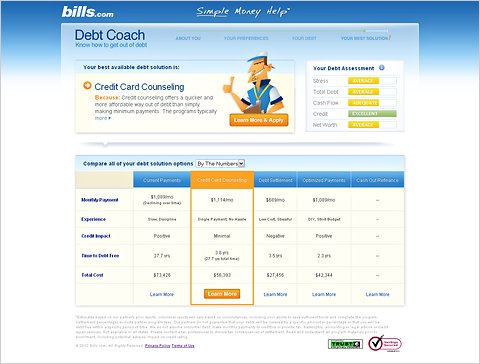
A new tool from Bills.com can pull your actual credit card balances from the credit bureau Experian to analyze your debt. It then provides detailed options for getting rid of it, customized to your situation.
The tool, called Debt Coach, also offers what Bills.com says is previously unavailable information on so-called “concession” or “settlement” rates that credit card companies typically offer, should you decide to enter into a formal agreement to pay off your balances.
Brad Stroh, founder and chief executive of Bills.com, said the tool gives more information to consumers evaluating various debt payment options. “We did a ton of work on the data aggregation,” Mr. Stroh said in a telephone interview. “We’re the only one with this type of tool.” The tool debuted on Wednesday at the Finovate conference in San Francisco, a semiannual gathering of providers of online financial tools.
Here’s how it works.
Users enter information on their financial situation by answering questions about whether they own a home, what they think their credit score is and their ZIP code. They then rank their desired outcome: Is preserving their credit score the most important to them? Do they want low monthly payments, or do they want to get rid of the debt as quickly as possible? Are they willing to put up with some stress and uncertainty, or do they want a clear outcome?
Next, users enter their name and date of birth so the tool can download their credit card data from Experian. (They don’t have to enter their Social Security number.) Experian first verifies their identity by asking questions drawn from information in their credit report. The system is similar to the process that Experian and the other major credit bureaus use to verify the identities of consumers seeking online access to their credit report, and may include questions related to previous addresses or lenders. No account numbers are transferred to Debt Coach, Mr. Stroh said.
Although users are accessing information from their credit report, it’s considered a “soft” pull of information, rather than a full credit inquiry initiated as a part of a credit application, and so does not affect the user’s credit score, Mr. Stroh said. The inquiry is free to consumers. Debt Coach pays a fee to Experian for the information, he said. The information transferred doesn’t include the user’s credit score because that information is more expensive to gather and Debt Coach would probably have to charge users a fee to provide it, Mr. Stroh said.
After the information is transferred, the tool lists the user’s credit card balances and the current interest rate being paid, along with the “concession” rate available if the user chooses various options. The user can see, for example, that he’s paying 25 percent on a Best Buy store card, but can reduce that to 9 percent by going to an approved credit counseling program. Similarly, a 14.35 percent rate on a Chase card could go down to 6 percent. (The tool focuses on unsecured debt, not secured debt like a mortgage or car loan, because there generally isn’t a concession rate available for those types of loans.)
The tool then lists, side by side, five options available to users, including maintaining their current payment schedule; setting up a self-payment schedule with, say, a “snowball” strategy, in which minimum payments are met and any extra funds are applied to the highest rate debt; credit counseling; debt settlement; or using cash from a refinancing of their home, if they own one.
The tool outlines the pros and cons of each option and highlights the one that best fits the customer’s stated preferences and goals. Using debt settlement, for example, in which a firm often charges a fee to negotiate a reduction in your debt, can end up being a lower-cost option, but it’s riskier and more stressful. Your credit score will probably take a big hit, and lenders can continue making collection calls throughout the negotiations and may even start legal action. Unless a user’s stated preference leads to debt settlement as the best solution, Debt Coach offers a warning stating that it is a “nontraditional form of debt consolidation, and should only be used by consumers with severe financial hardship.”
Seeking credit counseling may not reduce your debt as much, but collection efforts cease once a plan is agreed upon, so it’s less stressful.
The tool offers referrals to firms it considers reputable. If a consumer seeks a consultation with one of them, Bills.com collects a referral fee (as it does with other types of referrals elsewhere on the site, like those to mortgage lenders). The company estimates, for instance, that fees from debt settlement firms represent less than 7 percent of its revenue. But, Mr. Stroh said in a follow-up e-mail, “there is no ‘bias’ toward any one tool or solution in Debt Coach.”
If you’re worried about managing your credit card debt, does this sound like a tool you would try? If you use Debt Coach, please let us know about your experience.
Article source: http://feeds.nytimes.com/click.phdo?i=b6b050b796c610dd72500d82083cbe6d
Speak Your Mind
You must be logged in to post a comment.